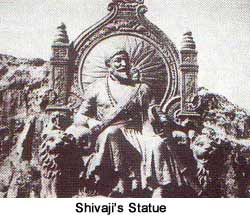

 |  |
 In the seventeenth century, Maratha chiefs took service with the local Muslim states, and one of them Shahji, was a fiefholder of Bijapur. The poor condition of the state tempted his son Shivaji to add to his father's holding on his own account. Shivaji was born in Fort Shivneri, Pune. He was brought up by his mother, Jijabai.
In the seventeenth century, Maratha chiefs took service with the local Muslim states, and one of them Shahji, was a fiefholder of Bijapur. The poor condition of the state tempted his son Shivaji to add to his father's holding on his own account. Shivaji was born in Fort Shivneri, Pune. He was brought up by his mother, Jijabai. From his early childhood days Shivaji was fond of listening to the great epic stories of Mahabharata and Ramayana which his mother Jijabai used to tell him. Impressed by the stories Shivaji dreamt of a nation built on the fundamentals laid down by Lord Krishna. His Mother Jijabai was an ambitious lady and wanted her son to fight for the Hindu self-esteem and Maratha pride, unlike his father. She encouraged Shivaji to expand his fathers Pune estates and form an independent, Maratha homeland. Shivaji led a rebellion which the general Afzal Khan was sent to put down. But Shivaji disposed of him (in 1659) in a private parley by embracing him with steel claws attached to his fingers. The legend still survives in the memory of Indians. Who hold in awe the acumen of Shivaji. Shivaji was now independent, too strong for the feeble Bijapur government, too distant and insignificant for the Mughals. He remedied this by sacking the great Mughal port of Surat in 1664 when only the English merchants successfully defended themselves in their warehouses. Perturbed by this incident Aurangzeb dispatched several Mughal campaigns against him and Shivaji was finally arrested by the Rajput Jai Singh. A settlement was attempted on the lines of Akbar's deal with the Rajputs and Shivaji journeyed to Aurangzeb's court in Agra. But it broke down due to the last minute betrayal by Aurangzeb. Shivaji was arrested along with his son Sambhaji. But a legendary escape followed in a carton filled with fruits meant to be distributed among the poor, along with a daring journey. Shivaji was a genius, a leader par-excellence. He always respected women, inspite of the fact that many Muslim women who were taken as prisoners by his armed forces, he never allowed his men to disregard them. In 1674, Shivaji was crowned as raja (ruler) and took the title chhatrapati. By the time of his death in 1680 he had left behind a compact, well organized kingdom in western India. His genius lay not only in outwitting the Mughals with guerilla tactics, but also welding the people, caste-conscious Brahmin and independent Shudra, into a harmonious whole. The defense of cow and country, of religion and the homeland, was the war cry. It was both Maratha nationalism and Maratha Hinduism, an embryonic regional national state. The struggle which recommenced when Aurangzeb went to the Deccan in 1681 and intensified after the fall of the Deccan kingdoms lasted for twenty-six years until his death. It ranged over the whole of the Deccan and over the far south. It exhausted the empire and ruined its morale; in fact it broke the empire as well as emperor's heart. next page >> |
Copyright ©2000 indiansaga.info. All rights reserved.
By using this service, you accept that you won't copy or use the data given in this website for any commercial purpose.
The material on indiansaga.info is for informational & educational purpose only.
This site is best viewed at 800 X 600 picture resolution.